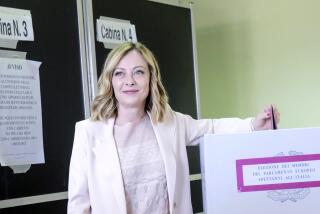Milosevic Calls Elections for Sept. 24
- Share via
VIENNA — After months of increasing repression that has weakened the already fractured opposition in Yugoslavia, President Slobodan Milosevic’s government announced Thursday that Serbia and the Yugoslav federation will hold elections Sept. 24.
The decision to conduct presidential, parliamentary and local elections came exactly three weeks after Milosevic rewrote a constitution that had prohibited him from running for reelection after his term expires next year. Under the new constitution, he can potentially hold on to power for two more terms of four years each.
Milosevic pulled off what opposition politicians called “a constitutional coup” in a matter of hours July 6--with the unintended help of his foes. The Serbian Renewal Movement, led by Vuk Draskovic, was boycotting parliament, thus guaranteeing that there were not enough votes to defeat Milosevic’s constitutional amendments.
Draskovic, a mercurial politician who consistently ranks as one of Serbia’s most popular leaders, may ensure Milosevic’s reelection as well.
Draskovic has refused to create a united front with other opposition parties, which argue that only a coalition supporting a single candidate can defeat Milosevic, who has been indicted on war crimes charges by the international tribunal at The Hague.
Although public opinion polling is often unreliable in Yugoslavia, surveys consistently suggest that Milosevic will win if the opposition does not unite behind a single candidate.
Milosevic, with just 13.7% support, was ranked as Yugoslavia’s most popular politician in a survey conducted in Serbia and Montenegro by Mark-Plan, an independent polling firm in Belgrade, the Serbian and Yugoslav capital. The results were published July 19.
Draskovic came second, with 6.3%. Milo Djukanovic, president of Montenegro, the pro-Western partner of Serbia in the Yugoslav federation, placed third in the poll, with support from 4.9% of those surveyed.
In yet another sign of deep cynicism and disappointment with Milosevic and his opponents alike, 39.5% said they trust no politician.
Milosevic’s Socialist Party is the most popular one in Serbia, with the backing of 17.6% of those polled. If the opposition ended its bickering to present a united front, it could--with 32.2% backing--defeat Milosevic, the survey suggested.
Draskovic’s Serbian Renewal Movement could expect to get only 11.5% of the votes, according to the poll.
The man most often named the best candidate to take on Milosevic as head of a united opposition is Vojislav Kostunica, a soft-spoken Serbian nationalist and former law professor and dissident.
A “sworn anti-communist,” Kostunica comes across as a stiff and boring “intellectual,” no match for the charisma of Draskovic and his main rival, Democratic Party head Zoran Djindjic. But unlike them, Kostunica isn’t seen as a corrupt ally of the West.
“He has never forgotten Western leaders’ bombing of Serbia,” columnist Ljubodrag Stojadinovic wrote in the independent daily Glas Javnosti. “He has never met the people who personified [NATO] aggression. However, that doesn’t mean that he is not ready to talk to the democratic West.”
Kostunica would stand a “great” chance against Milosevic, Djindjic said last week.
Draskovic has remained in Montenegro since assassins almost killed him at his seaside home there June 15.
Draskovic’s party may reconsider its boycott of the elections if certain conditions are met, including that the vote be free and fair, spokesman Ivan Kovacevic said Thursday.
Draskovic and his party are likely to contest municipal elections in the hope of holding on to control of local government and the lucrative payoffs, especially in Belgrade.
Allowing the opposition to hold power in several towns and cities has proved one of Milosevic’s most successful strategies: Opposition politicians compete with each other for control of local government because they can enrich themselves through endemic corruption.
Djukanovic, the Montenegrin president, has repeatedly said his republic will boycott any federal poll he considers illegal. Djukanovic has also suggested many times that he may call a referendum on independence, only to step back in the face of threats from Belgrade.
“The situation in Montenegro is very worrying,” George Robertson, secretary-general of the North Atlantic Treaty Organization, said in Paris on Thursday after meeting with French Prime Minister Lionel Jospin.
“I again repeat my warning to President Milosevic not to make mistakes that he has made in the past and not to continue to undermine the elected government of Montenegro,” Robertson added.
Parliamentary and local elections weren’t due until November, but Milosevic apparently had an eye on Kosovo when setting an earlier date for the balloting.
Although Kosovo is still technically a province of Serbia, a United Nations administration runs the territory as a virtual protectorate and has scheduled local elections for October.
As many as 100,000 Serbs still live in Kosovo, but only a few registered for the October vote even though the U.N. pushed hard to break the boycott by extending its registration for a few days earlier this month.
The U.N. estimates that 210,000 Serbs and members of other minorities fled Kosovo to Serbia proper when ethnic Albanian extremists began killing non-Albanians and burning homes after NATO-led peacekeepers took control of the province in June 1999.
Belgrade is expected to invite Kosovo Serbs to cross the administrative border to vote in September.
*
Special correspondent Zoran Cirjakovic in Belgrade contributed to this report.
More to Read
Sign up for Essential California
The most important California stories and recommendations in your inbox every morning.
You may occasionally receive promotional content from the Los Angeles Times.













